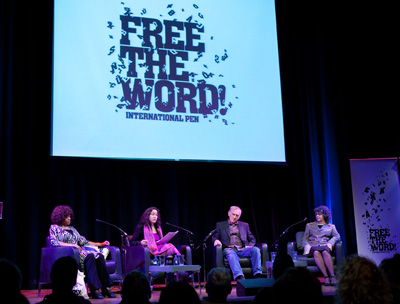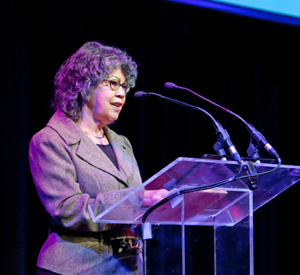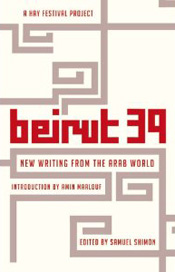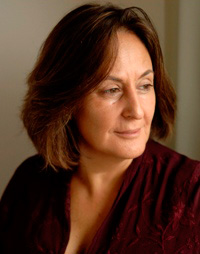
 Having never been to a literature festival before, I jumped at the
chance to go to the PEN "Free the Word!" Festival in London this April. International PEN is a worldwide association of writers
established to promote writing in English and in translation, and to defend free speech. Their ventures include the Writers
in Prison Committee, which supports and advocates on behalf of writers who have been imprisoned or are under threat of
imprisonment because of the views they have expressed. The "Free the Word!" Festival ran for five days and brought
together writers—some I had heard of and many I had not—from all over the globe for discussions around the
theme of "Words, words, nothing but words?" I was fortunate to attend several PEN sessions, and I learnt a lot.
Having never been to a literature festival before, I jumped at the
chance to go to the PEN "Free the Word!" Festival in London this April. International PEN is a worldwide association of writers
established to promote writing in English and in translation, and to defend free speech. Their ventures include the Writers
in Prison Committee, which supports and advocates on behalf of writers who have been imprisoned or are under threat of
imprisonment because of the views they have expressed. The "Free the Word!" Festival ran for five days and brought
together writers—some I had heard of and many I had not—from all over the globe for discussions around the
theme of "Words, words, nothing but words?" I was fortunate to attend several PEN sessions, and I learnt a lot.



The first event on my festival calendar was "The Ex Empire Strikes Back", a discussion panel with Journalist Maya Jaggi (moderator), Scottish writer James Kelman, Jamaican-born poet and short story writer Olive Senior, and ground-breaking publisher Margaret Busby, about the use of English around the world, and in particular the use of what might be regarded as non-standard English. Olive Senior read a beautiful extract from her short story "The Ballad" in lovely, lilting Jamaican Creole. James Kelman read from his new book of short stories in a rapid Glaswegian monologue, and Margaret Busby read from Nii Aykwe Parkes' new crime fiction, The Tail of the Blue Bird , which mixes Ghanaian and English to great effect. All three felt that in the past, writers who have not expressed themselves in "standard English" have been marginalised by publishers who are not open-minded about non-standard usage. Olive Senior recalled being asked to "write in English" despite the fact she is renowned for using different types of English in her writing. Margaret Busby argued that a publisher should not dictate the style of language used—after all, a good book is a good book. The consensus was that the use of non-standard English reflects the richness and diversity of human experience and should be encouraged, and that the use of standard English alone should be rebelled against!


The following day, refreshed by a walk back over the windswept Thames, I went to the Pen HQ to listen to Palestinian
writers Adania Shibli and Ala Hlehel talk about their writing. Both authors were chosen as part of the Hay Festival's
"Beirut 39" project, which celebrates 39 promising writers under the age of 40 from throughout the Arab world. Each
of the writers is included in the Beirut 39 anthology, published last month by Bloomsbury. All 39 writers were
invited to the April 2010 Hay Festival in Lebanon to receive accolades. However, Adania Shibli from Ramallah and Ala
Hlahel from Haifa were unable to travel to Lebanon due to restrictions placed on travellers who hold Israeli passports.
 At the PEN event in London, Adania Shibli read an extract from her novel We are All Equally Far From Love, which
is expected to be published in English in 2011 by Clockroot Books. The extract, entitled "The Post Office", is based
on a true incident of a girl who got so bored working in the post office that she started to open the mail. Shibli
related that it is essential for her to write, and that she is not sure she would write if she did not use Arabic. She
was funny as well: when asked for her inspiration in writing, she answered that she has read much English writing in Arabic
and now regards these writers as Arabic!
At the PEN event in London, Adania Shibli read an extract from her novel We are All Equally Far From Love, which
is expected to be published in English in 2011 by Clockroot Books. The extract, entitled "The Post Office", is based
on a true incident of a girl who got so bored working in the post office that she started to open the mail. Shibli
related that it is essential for her to write, and that she is not sure she would write if she did not use Arabic. She
was funny as well: when asked for her inspiration in writing, she answered that she has read much English writing in Arabic
and now regards these writers as Arabic!
Adania Shibli and Ala Hlehel spoke with passion about the difficulties of everyday life in their country because everything becomes politicised. Even something as simple as travelling to meet another writer may involve crossing an armed checkpoint or could even be impossible. The discussion became increasingly animated; questions from the audience included, 'Will you talk to Israeli authors?', 'Can you be a Palestinian writer without being political?' I found this short talk to be inspiring. We take so much for granted living in the UK—our freedom to travel around the country, our freedom of speech—and yet we are often politically apathetic because we think public participation in politics makes no difference. The Beirut 39 anthology is fascinating and thought-provoking; it is a treasure trove of new writing.


During the "Free the Word!" Festival, London was surrounded by a volcanic cloud from Iceland, which grounded planes in all
UK airports and prevented many writers from attending the festival, including Donato Ndongo-Bidyogo and Juan Gabriel
Vasquez, who had been scheduled for the "Fact in Fiction" event. Nevertheless, Gillian Slovo carried on with the event, discussing her novel, Red Dust, a fictionalisation of the Truth and Reconciliation Commission
set up in her native South Africa. Slovo based the novel upon her own experience of watching her mother's murderer be
questioned through the Truth and Reconciliation process. Although she has lived in London for over 45 years, she
returned to South Africa to attend this trial. Despite her personal involvement with the Truth and Reconciliation
Commission, Slovo made it clear that she did not want her novel to take sides; she felt that her narrative must be
dispassionate and neutral. The fact that the African National Congress (ANC) had created an amnesty meant that the
accused did not face trial and so could speak freely without the fear of recrimination. The opportunities for Slovo to
speak honestly about her own experience through her characters must have been nearly irresistible, even though the book
is not the real-life story of the author's mother; rather, it is a novel in its own right about the struggle of parents
to find out the truth of their son's murder. Slovo's achievement in using her own raw experience to write Red Dust
is nothing short of amazing. 
Gillian Slovo was also asked about the process of writing her play Guantanamo. When preparing to write, she interviewed family members and lawyers of detainees about the detainees' actual experiences at Guantanamo. The realisation that there is no happy ending to this story has resulted in stunned silences from audiences in New York. I was very impressed by Gillian Slovo. She is a strong lady—erudite, succinct, passionate and articulate, despite the distraction of the photographer's flash going off in her face every five seconds!
The "Free the Word!" festival is a much needed diversion from the usual hype of the book world, which would have us believe that all we need to read are bestsellers about teenage wizards on broomsticks, religious conspiracy theories, and political exposés. Bringing together writers from all around the world to meet in London will, I hope, raise the profile of these talented but lesser known writers and sell more of their books, while at the same time open more minds to the everyday struggles of people around the world.

What have I learnt?
• Writers are extremely passionate about their work.
• The use of non-standard English enriches a novel.
• That publishers should be less worried about what sells than about selling what is good.
• And real experiences can and should be used in fiction.
• I have also been reminded that word of mouth is a very strong marketing tool, and that readers have a responsibility to pass on their recommendations to others. And so I recommend that you find and read Olive Senior's poetry and short stories or any of Gillian Slovo's many novels. And please do not forget to pick up a copy of Adania Shibli's We Are All Equally Far From Love when it is published in 2011 (or, even better, while you are waiting for that, you could read her novel Touch, which is available now and is reviewed in this issue of Belletrista). My only regret is that I could not attend all of the PEN talks, and stay in London longer!
Photo Credits: Photo 1: (Panel Discussion) and Photo 2: (Olive Senior) © Graham Jepson/Writer Pictures
Photo 3: (Gillian Slovo) © Charlie Hopkinson.

Ceri Evans lives amidst the green green grass of North Wales. She is a family lawyer who prefers
reading to anything else. She would secretly love to drop everything and open a second hand book shop.
